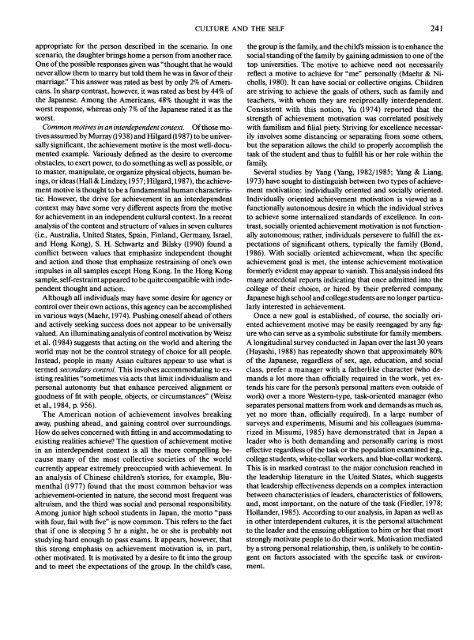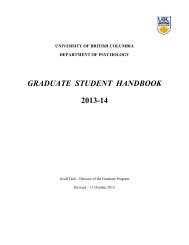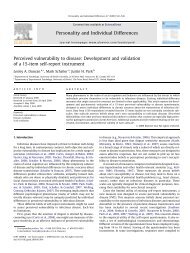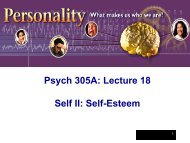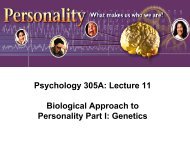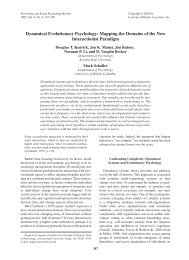Culture and the Self: Implications for Cognition, Emotion, and ... - iacmr
Culture and the Self: Implications for Cognition, Emotion, and ... - iacmr
Culture and the Self: Implications for Cognition, Emotion, and ... - iacmr
Create successful ePaper yourself
Turn your PDF publications into a flip-book with our unique Google optimized e-Paper software.
CULTURE AND THE SELF 241<br />
appropriate <strong>for</strong> <strong>the</strong> person described in <strong>the</strong> scenario. In one<br />
scenario, <strong>the</strong> daughter brings home a person from ano<strong>the</strong>r race.<br />
One of <strong>the</strong> possible responses given was "thought that he would<br />
never allow <strong>the</strong>m to marry but told <strong>the</strong>m he was in favor of <strong>the</strong>ir<br />
marriage." This answer was rated as best by only 2% of Americans.<br />
In sharp contrast, however, it was rated as best by 44% of<br />
<strong>the</strong> Japanese. Among <strong>the</strong> Americans, 48% thought it was <strong>the</strong><br />
worst response, whereas only 7% of <strong>the</strong> Japanese rated it as <strong>the</strong><br />
worst.<br />
Common motives in an interdependent context. Of those motives<br />
assumed by Murray (1938) <strong>and</strong> Hilgard (1987) to be universally<br />
significant, <strong>the</strong> achievement motive is <strong>the</strong> most well-documented<br />
example. Variously defined as <strong>the</strong> desire to overcome<br />
obstacles, to exert power, to do something as well as possible, or<br />
to master, manipulate, or organize physical objects, human beings,<br />
or ideas (Hall & Lindzey, 1957; Hilgard, 1987), <strong>the</strong> achievement<br />
motive is thought to be a fundamental human characteristic.<br />
However, <strong>the</strong> drive <strong>for</strong> achievement in an interdependent<br />
context may have some very different aspects from <strong>the</strong> motive<br />
<strong>for</strong> achievement in an independent cultural context. In a recent<br />
analysis of <strong>the</strong> content <strong>and</strong> structure of values in seven cultures<br />
(i.e., Australia, United States, Spain, Finl<strong>and</strong>, Germany, Israel,<br />
<strong>and</strong> Hong Kong), S. H. Schwartz <strong>and</strong> Bilsky (1990) found a<br />
conflict between values that emphasize independent thought<br />
<strong>and</strong> action <strong>and</strong> those that emphasize restraining of one's own<br />
impulses in all samples except Hong Kong. In <strong>the</strong> Hong Kong<br />
sample, self-restraint appeared to be quite compatible with independent<br />
thought <strong>and</strong> action.<br />
Although all individuals may have some desire <strong>for</strong> agency or<br />
control over <strong>the</strong>ir own actions, this agency can be accomplished<br />
in various ways (Maehr, 1974). Pushing oneself ahead of o<strong>the</strong>rs<br />
<strong>and</strong> actively seeking success does not appear to be universally<br />
valued. An illuminating analysis of control motivation by Weisz<br />
et al. (1984) suggests that acting on <strong>the</strong> world <strong>and</strong> altering <strong>the</strong><br />
world may not be <strong>the</strong> control strategy of choice <strong>for</strong> all people.<br />
Instead, people in many Asian cultures appear to use what is<br />
termed secondary control. This involves accommodating to existing<br />
realities "sometimes via acts that limit individualism <strong>and</strong><br />
personal autonomy but that enhance perceived alignment or<br />
goodness of fit with people, objects, or circumstances" (Weisz<br />
etal.,1984, p. 956).<br />
The American notion of achievement involves breaking<br />
away, pushing ahead, <strong>and</strong> gaining control over surroundings.<br />
How do selves concerned with fitting in <strong>and</strong> accommodating to<br />
existing realities achieve? The question of achievement motive<br />
in an interdependent context is all <strong>the</strong> more compelling because<br />
many of <strong>the</strong> most collective societies of <strong>the</strong> world<br />
currently appear extremely preoccupied with achievement. In<br />
an analysis of Chinese children's stories, <strong>for</strong> example, Blumenthal<br />
(1977) found that <strong>the</strong> most common behavior was<br />
achievement-oriented in nature, <strong>the</strong> second most frequent was<br />
altruism, <strong>and</strong> <strong>the</strong> third was social <strong>and</strong> personal responsibility.<br />
Among junior high school students in Japan, <strong>the</strong> motto "pass<br />
with four, fail with five" is now common. This refers to <strong>the</strong> fact<br />
that if one is sleeping 5 hr a night, he or she is probably not<br />
studying hard enough to pass exams. It appears, however, that<br />
this strong emphasis on achievement motivation is, in part,<br />
o<strong>the</strong>r motivated. It is motivated by a desire to fit into <strong>the</strong> group<br />
<strong>and</strong> to meet <strong>the</strong> expectations of <strong>the</strong> group. In <strong>the</strong> child's case,<br />
<strong>the</strong> group is <strong>the</strong> family, <strong>and</strong> <strong>the</strong> child's mission is to enhance <strong>the</strong><br />
social st<strong>and</strong>ing of <strong>the</strong> family by gaining admission to one of <strong>the</strong><br />
top universities. The motive to achieve need not necessarily<br />
reflect a motive to achieve <strong>for</strong> "me" personally (Maehr & Nicholls,<br />
1980). It can have social or collective origins. Children<br />
are striving to achieve <strong>the</strong> goals of o<strong>the</strong>rs, such as family <strong>and</strong><br />
teachers, with whom <strong>the</strong>y are reciprocally interdependent.<br />
Consistent with this notion, Yu (1974) reported that <strong>the</strong><br />
strength of achievement motivation was correlated positively<br />
with familism <strong>and</strong> filial piety. Striving <strong>for</strong> excellence necessarily<br />
involves some distancing or separating from some o<strong>the</strong>rs,<br />
but <strong>the</strong> separation allows <strong>the</strong> child to properly accomplish <strong>the</strong><br />
task of <strong>the</strong> student <strong>and</strong> thus to fulfill his or her role within <strong>the</strong><br />
family.<br />
Several studies by Yang (Yang, 1982/1985; Yang & Liang,<br />
1973) have sought to distinguish between two types of achievement<br />
motivation: individually oriented <strong>and</strong> socially oriented.<br />
Individually oriented achievement motivation is viewed as a<br />
functionally autonomous desire in which <strong>the</strong> individual strives<br />
to achieve some internalized st<strong>and</strong>ards of excellence. In contrast,<br />
socially oriented achievement motivation is not functionally<br />
autonomous; ra<strong>the</strong>r, individuals persevere to fulfill <strong>the</strong> expectations<br />
of significant o<strong>the</strong>rs, typically <strong>the</strong> family (Bond,<br />
1986). With socially oriented achievement, when <strong>the</strong> specific<br />
achievement goal is met, <strong>the</strong> intense achievement motivation<br />
<strong>for</strong>merly evident may appear to vanish. This analysis indeed fits<br />
many anecdotal reports indicating that once admitted into <strong>the</strong><br />
college of <strong>the</strong>ir choice, or hired by <strong>the</strong>ir preferred company,<br />
Japanese high school <strong>and</strong> college students are no longer particularly<br />
interested in achievement.<br />
Once a new goal is established, of course, <strong>the</strong> socially oriented<br />
achievement motive may be easily reengaged by any figure<br />
who can serve as a symbolic substitute <strong>for</strong> family members.<br />
A longitudinal survey conducted in Japan over <strong>the</strong> last 30 years<br />
(Hayashi, 1988) has repeatedly shown that approximately 80%<br />
of <strong>the</strong> Japanese, regardless of sex, age, education, <strong>and</strong> social<br />
class, prefer a manager with a fa<strong>the</strong>rlike character (who dem<strong>and</strong>s<br />
a lot more than officially required in <strong>the</strong> work, yet extends<br />
his care <strong>for</strong> <strong>the</strong> person's personal matters even outside of<br />
work) over a more Western-type, task-oriented manager (who<br />
separates personal matters from work <strong>and</strong> dem<strong>and</strong>s as much as,<br />
yet no more than, officially required). In a large number of<br />
surveys <strong>and</strong> experiments, Misumi <strong>and</strong> his colleagues (summarized<br />
in Misumi, 1985) have demonstrated that in Japan a<br />
leader who is both dem<strong>and</strong>ing <strong>and</strong> personally caring is most<br />
effective regardless of <strong>the</strong> task or <strong>the</strong> population examined (e.g.,<br />
college students, white-collar workers, <strong>and</strong> blue-collar workers).<br />
This is in marked contrast to <strong>the</strong> major conclusion reached in<br />
<strong>the</strong> leadership literature in <strong>the</strong> United States, which suggests<br />
that leadership effectiveness depends on a complex interaction<br />
between characteristics of leaders, characteristics of followers,<br />
<strong>and</strong>, most important, on <strong>the</strong> nature of <strong>the</strong> task (Fiedler, 1978;<br />
Holl<strong>and</strong>er, 1985). According to our analysis, in Japan as well as<br />
in o<strong>the</strong>r interdependent cultures, it is <strong>the</strong> personal attachment<br />
to <strong>the</strong> leader <strong>and</strong> <strong>the</strong> ensuing obligation to him or her that most<br />
strongly motivate people to do <strong>the</strong>ir work. Motivation mediated<br />
by a strong personal relationship, <strong>the</strong>n, is unlikely to be contingent<br />
on factors associated with <strong>the</strong> specific task or environment.


